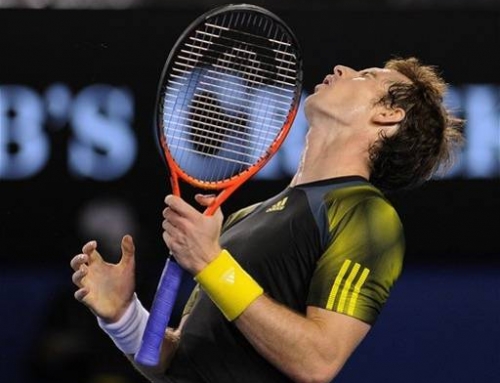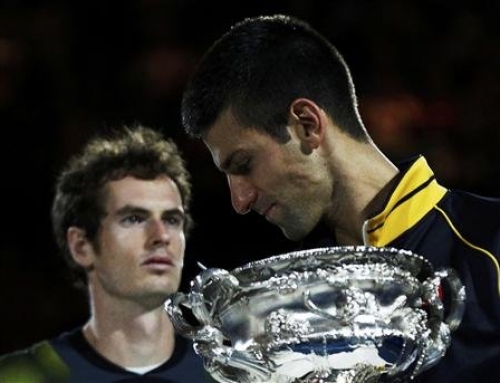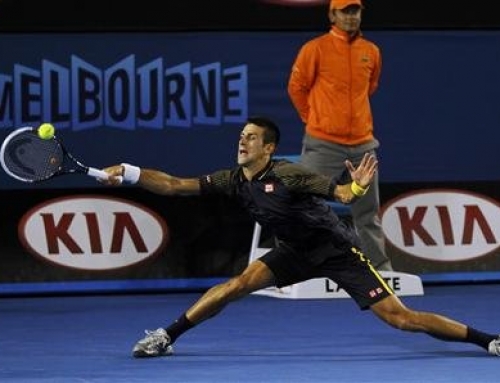
But time went by, and the titles didn’t come. Don’t you know? There’s a guy named Roger Federer on the block, and man is that guy talented. Roger would knock out Roddick in 8 Slams. Surely, he would have won a few of those had he gotten past his rival.
It didn’t help that Federer would find someone that could push him, that would take him out on clay and push him on any surface. That man, of course, Rafael Nadal.
And soon, the list of names that slipped past Roddick began to grow. At one point, it was players like Nikolay Davydenko. Then, Novak Djokovic and then Andy Murray and then Juan Martin del Potro. At this point, Roddick had to wonder, much like Salieri wondered of his own talent compared to Mozart, why he was blessed with the big serve, the big forehand, and yet not enough talent to play the shots like Federer, to hit the ball like Nadal. Roddick didn’t quite despair. He remade himself into a different player, a guy who understood that tennis, first and foremost, is a game of errors. Cut down on your errors, and you can win. It is not flashy tennis. It does not make the audience gasp. But it does put you in second weeks of Slams. It does put you in the story.
Andy Roddick had been seeded to meet Juan Martin del Potro. This match would have been one that, ordinarily, would have favored del Potro. del Potro had come out of nowhere to beat Andy Roddick in Los Angeles back in 2008. At the time, Roddick must have felt like Justine Henin losing to Dinara Safina. Who was del Potro anyway? At the time, he must have felt his game was falling apart. It probably didn’t occur to him that del Potro might be that rare special talent who was ready to make a quick ascension to the top of the ranks, much like it didn’t occur to Henin that Safina might be someone that could rise to number 1.
But it wasn’t del Potro. Every year, people look to the next talent even before the current talent has fully sprouted. Juan Martin del Potro had only been at the very top a year and a half or so, and already, the tennis cognoscenti looked at the new next one. And those eyes trained on a skinny Croat, a guy as tall as del Potro, but whose silky strokes, and smooth movement suggested an upside that knew no bounds.
Marin Cilic had his chances to beat del Potro back at the US Open and even back at the Australian Open from a year ago, but del Potro showed mental toughness and beat back the threat. This year, with del Potro struggling with a wrist injury, Cilic finally held out for five set, and beat the Argentine.
Early on, with only a game or two in, Andy Roddick looked to be in trouble. Roddick plays a game predicated on winning his service games easily. Roddick doesn’t have the kind of game that can get him out of break points with the same kind of assurance as Rafael Nadal. Roddick relies on a big serve to get him out of trouble. Early on, Cilic was getting break point opportunities and forcing Roddick to play long points on his own serve.
Roddick’s current style is to play steady. Hit hard enough for his opponents not to take advantage of his shots, but steady enough that they can make errors. The problem with this style? When he needs to pull the trigger, to hit the big shot at the big moments, the shot is often not there. Roddick is no Davydenko who waits to pull the trigger and can hit winners inches from any sideline. Roddick found himself hitting hard shots feet away from any sideline, with a margin of safety so large that it was hardly an offensive shots. On the rare moments you could see him wanting to hit big, sooner, he found himself with an error.
Cilic took the first set, 7-6. By the end of the first set, Roddick was already asking for the trainer who was massaging his shoulder. In a post-match interview, Roddick would say that he was losing feeling in his fingers. As long as he could receive assurances that he was not causing permanent damage to his body, he would play. He could still hit, but it was difficult for him to get good control of the shot. Roddick found himself down again, losing the second set, 6-3.
But it’s here where Roddick dug deep. If he had a chance to win, one chance he had was Cilic’s low first serve percentage. Cilic has a good first serve, but with his low first serve percentage, Roddick was getting looks at his second serve. And this is where Roddick’s heart, his never-say-die attitude carried him through. He had an early break in the third set and carried that to a 6-3 win.
In the fourth set, Roddick picked up the level of aggression and broke Cilic three times to Cilic’s one break and had the second set, 6-2. This pushed the match into the fifth set.
In the start of the fifth set, Roddick was up 0-40 on Cilic’s initial serve. But Cilic, whose first serve percentage was around 50% suddenly raised the number of first serves up to 60% and this additional heat on the first serve was enough to save that game, and put the pressure back on Roddick. Roddick’s game that had lead to so many break opportunities would lead to no more. Roddick would not see break point again while Cilic would get the one break he needed. Cilic would take the fifth set, 6-3, and Roddick would find himself exiting out of the quarterfinals.
Cilic now heads into the semifinals having logged a lot of time on court. He’s still young and perhaps, for an up-and-comer, youth may be served. When Andy Roddick was asked about whether this match would affect Cilic, Roddick said, it will be a factor. The one advantage, he said, was that Cilic, like Agassi, plays the ball in front of him. He doesn’t get drawn off the edges of the court where he has to do extra running, and that would bode well for the amount of fatigue he’d have.
So now, Cilic awaits the winner of Nadal vs. Murray which is just getting started.






![[Aussie Open Final] Can Andy Murray beat Novak Djokovic?](https://www.essentialtennis.com/wp-content/uploads/2013/01/20130126andy-500x383.jpg)
![[Day 13, Aussie Open] Bryan brothers win 13th Slam with Aussie doubles title, Kyrgios wins boys title](https://www.essentialtennis.com/wp-content/uploads/2013/01/20130125bryan-500x383.jpg)